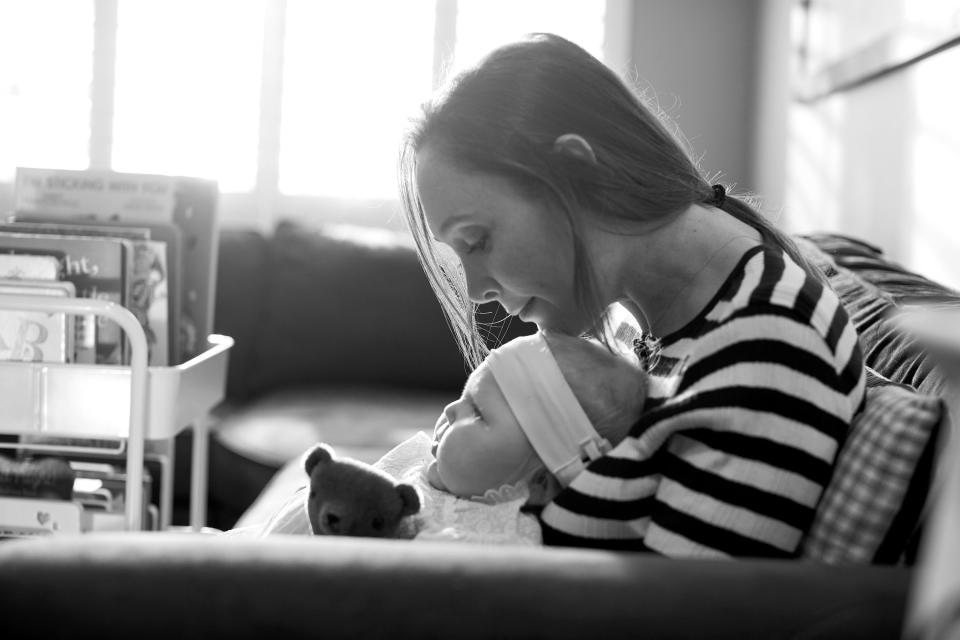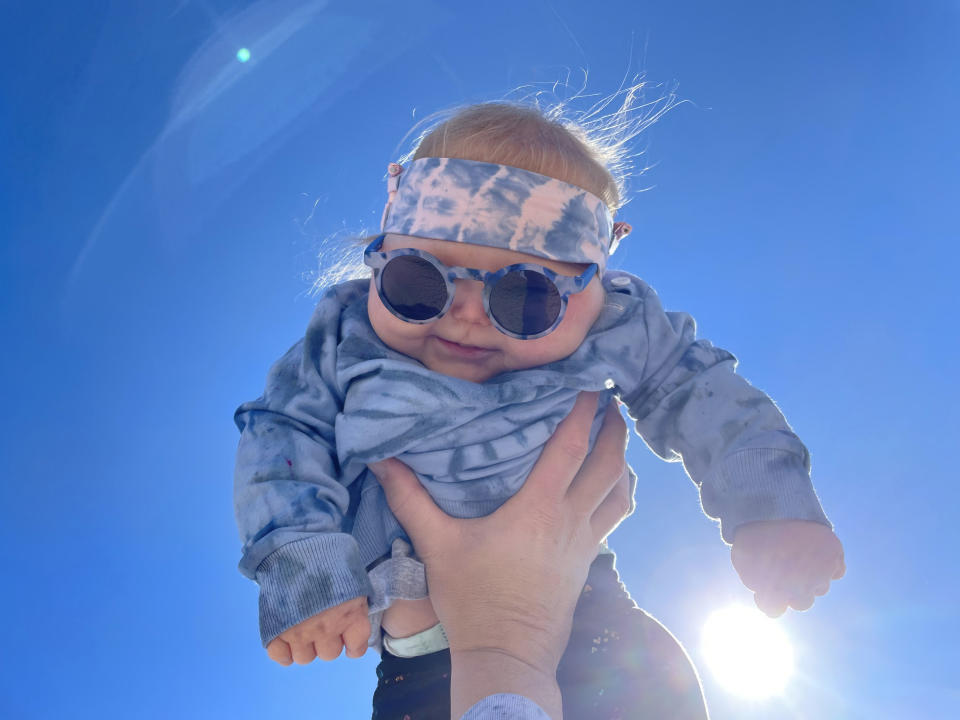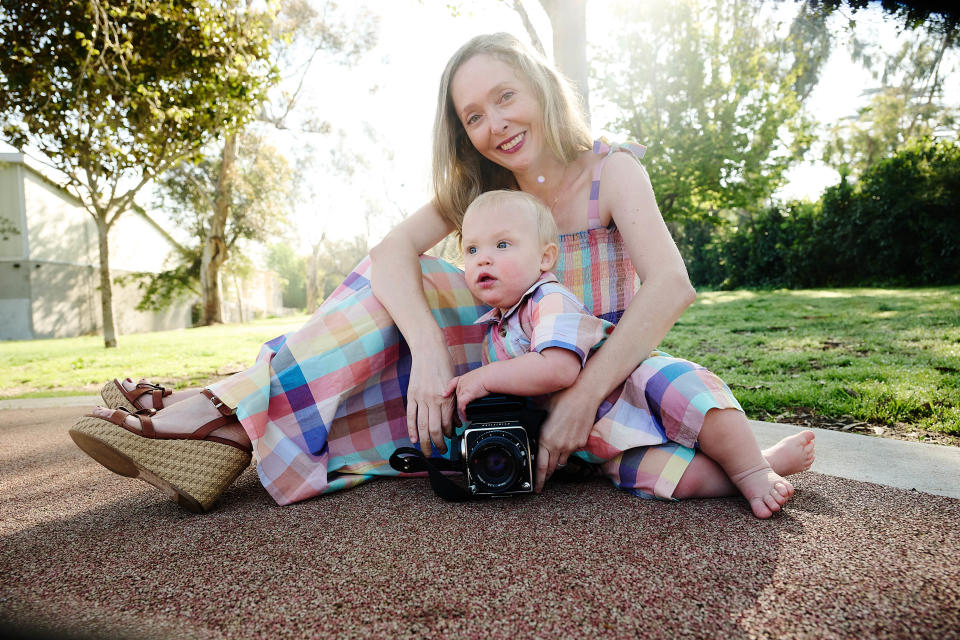What my late daughter taught me about being a mom
When I was 30, my mom offered to pay for me to freeze my eggs. Looking back, I realize how generous her offer was. But at the time, the suggestion felt as invasive as the procedure itself. My mom had known she wanted grandkids for as long as I had known I wanted to be a writer, and I was under the impression I had to choose between the two. I resented that the conversations always seemed to come up when I was on deadline for work. No matter that I was always on deadline for work.
There was another slight snag. I wasn’t interested in kids. Films and society told me I should feel differently, which annoyed me that much more.
How was I supposed to tell some kid to follow their dreams when I hadn’t yet achieved mine?
My mother, on the other hand, had always dreamed of being just that: a mother. She worked part-time as a speech pathologist over the course of 33 years, but she knew she wanted children long before she met my father. Once I was born, my mother’s profession became an expensive endeavor since child care cost more than she made. (It’s a problem many women still face today as they’re forced out of the workplace, as underscored by statistics during the pandemic.) Once my younger sister and brother were born, my mom had the good fortune of working extremely limited hours as my dad’s dental practice took off. While I always appreciated how dedicated my mother was to her children, I knew I wanted more.
As a teenager in the late ’90s, I created a website through which I interviewed celebrities like Mila Kunis, Britney Spears, Christina Aguilera and Mandy Moore over the phone from my childhood bedroom in South Florida. The site allowed me to connect with people in the entertainment industry, a world I wanted so badly to be a part of but one that felt so far away. After college in Boston, I fulfilled my lifelong dream of moving to Los Angeles, where I paid my dues by covering the red carpet and writing about Hollywood events. By my late 20s, interviewing celebrities and freelance writing financed my passion projects, which consisted of screenplays, novels and directing the occasional short film — a lot like everyone else in this town.
While I had a relatively fruitful career, there was still so much I wanted to accomplish. I wasn’t ready to be selfless, and that seemed like the No. 1 requirement for anyone considering parenthood.
My mother’s wishes aside, the other predicament was that my husband loves kids. I’ve known this about him since we started dating in our early 20s. He fussed over babies and cried at weddings, so I shouldn’t have been shocked when he proposed five years into dating. And yet I was.
“Are you f—--- kidding me?” I responded, as every husband-to-be dreams of hearing. “I mean, yes, of course. But wait. What?”
We were both 27 and I began referring to myself as a child bride.
Every female heroine I admired on-screen seemed to find “the one” in their mid-to-late 30s. Some had kids; most didn’t. I assumed I would follow a similar path. When I saw “Bridget Jones” as an impressionable 18-year-old, I didn’t appreciate that the character was intended as a cautionary tale. I just knew she was a quirky career woman and I saw myself in her. I never considered that my belief system was the result of a fictional character and two male screenwriters.
“What if I wake up one day and realize I don’t want kids?” I asked my husband, many months into wedding planning.
“We’ll cross that bridge when we get to it,” he said, as every wife-to-be dreams of hearing. Forget until death do us part. Would it be until no kids do us part?
The thought haunted me as we decided between vanilla or chocolate cake.
But I figured, like he said, “We’ll cross that bridge when we get to it.”
Only there was no bridge. Just one deadline after another. One job after another. One year after another. One annual appointment with my gynecologist after another. Our conversations about whether or not to have children became as routine as my birthday.
“I don’t know how I feel about kids right now,” I’d say to my doctor, as images of smiling babies taunted me from the walls of her exam room.
“You should freeze your eggs,” she’d say. “Thirty-two-year-old eggs aren’t as good as 31-year-old eggs.”
Cut to: “You know, 33-year-old eggs aren’t as good as 32-year-old eggs.”
Cut to: “Just remember, 34-year-old eggs aren’t as good as 33-year-old eggs.”
Cut to: “Don’t forget, 35-year-old eggs … ”
Yeah, yeah. I got it.
But I resented the pressure. From society. From my mom. From my inner voice that yelled, “You’re 34. You have a biological deadline. Get moving.”
The subtext stalked me. No place was off limits from the corners of my mind. I was particularly caught off-guard during a celebrity-attended, Champagne-sponsored polo match I’d written about many times over the years for various fashion magazines.
The carefree affair resonated differently as I asked guests the hard-hitting stuff journalism degrees are made of. “How did you choose your look for today?”
“I got this dress on eBay many years ago when I was pregnant with my daughter,” said one high-heeled perennial attendee in polka-dotted Chanel.
“I didn’t put a lot of thought into my outfit,” said another in a striking red Alexis dress. “My lifestyle is so busy with the family, so it’s just about what won’t get ruined before I make it out the door.”
“I got ready frantically, as I always do amidst the ankle biters,” said a third, clad in patterned vintage Prada.
There I was in the same old little black dress on a red-carpet-covered hamster wheel while everyone around me had been living their lives and building their families. It was only then I realized I’d been so busy writing about other people’s lives that I’d neglected my own.

Maybe society was onto something with this kid thing. I was finally willing to find out. But egg freezing and in vitro fertilization is expensive. And I was no longer a child bride who felt comfortable asking for financial help. If we were going to do this, we were going to try the old-fashioned way first.
My husband wasted no time downloading an ovulation app.
To my disbelief, one month later I was pregnant. Four months later, I told my mom. Five months later, my daughter Evan was born.
Three and a half years later, she passed away.

She was born with a terminal mitochondrial disease. One that could never have been detected prenatally. One that was so rare it took doctors two years to diagnose. Evan’s case now exists in medical journals while her magical, life-altering, soul-affirming, joyful spirit informs every move I make.
After her diagnosis, my husband and I were told there was a 25% chance of our future children having Evan’s disease. I could never roll the dice after witnessing what Evan went through. She’d been in and out of the hospital from the day she was born. She’d been poked more times than I can count. She’d been through multiple surgeries for a gastronomy feeding tube, cochlear implants, muscle biopsies and more. Evan smiled in between moments of pain and taught us to do the same. But I could never knowingly put a child through all that, if I didn’t have to.
And yet thanks to my warrior daughter, I now knew with certainty that I wanted to be a mother. Her magical spirit could never be replicated by any career high. Evan brought out the best in me — and in everyone around her. She taught me that you don’t have to choose between being selfless and selfish. Instead, I simply learned to better prioritize my time and what mattered most. In doing so, I discovered that ambition doesn’t disappear the moment you become a mother. If anything, it broadened my definition of ambition — and taught me to apply that same tenacity to family building — even in the face of uncertainty and heartbreak.
When Evan was 2 years old, my husband and I pursued IVF. Seventeen eggs led to 5 embryos, which led to 2 viable embryos after the others tested positive for Evan’s disorder.
During the embryo transfer, spa music played and the experience couldn’t have felt more Kumbaya-perfect. But days later, based on bloodwork, there were concerns I had an ectopic pregnancy, meaning the fetus may have been growing outside my womb.
I was terrified. It sounded dangerous, but my doctor calmed my nerves and assured me that it was, unfortunately, common and could be handled safely. I didn’t realize it at the time, but she meant an abortion.
As I waited for the verdict — and begged the universe to give my daughter a sibling — I was filled with tremendous anxiety, sadness and fear, while I went to various events for work and cared for Evan.

The transfer turned out to be a chemical pregnancy, which meant no procedure was necessary to ensure my personal safety. I naturally miscarried within days. I cried and held Evan while mourning the loss of what could have been.
We’d been told Evan’s life expectancy was likely between the ages of 16 months and 4 years old, so we knew we were operating on borrowed time. I often sobbed to my therapist about how exhausted I was — not from the day-to-day, which included over 30 medications given to Evan through her gastrostomy tube, or from doctor appointments with her 16 specialists — but from the bandwidth it took to hold on so tightly to each and every moment with my beautiful little girl who taught me to love babies as much as I’d once loved my independence.
My doctor arrived late to my second embryo transfer.
“You’ve got the right embryo, right?” I nervously asked.
“I think so…” she responded, as every mother-to-be dreams of hearing. “Someone else will confirm that.”
This was already shaping up to be a different experience. But I decided different was good. Maybe it would mean a different outcome. I noticed an Alexandra Nechita painting on the wall as I was wheeled out to my car. I’d recently interviewed the artist for a story, so I decided it was a good omen.
Then came a double rainbow outside my bedroom window. And later that week, I got the news that I was pregnant with my now 1-year-old son, Reid — who met Evan just before she passed away.

My son is no replacement for my daughter. The joy and the grief sit side by side, as they will for the rest of my life. But Reid’s toothless grins give me every reason to smile.
I recognize that parenthood isn’t the right choice for everyone, but it’s the most rewarding decision I’ve made. My former self might have rolled my eyes at such a statement, but now I can confidently say that I truly understand why my mom urged me to be a mother.
This article was originally published on TODAY.com

